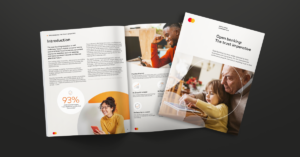From enhancing a more inclusive digital economy to creating fair and responsible credit decisions, there’s no doubt that open banking drives financial inclusion.
In the story below, we explore how open banking is paving the way for greater financial inclusion and the transformative impact it has on individuals and the economy.
A more inclusive digital economy
First things first, what is financial inclusion, and why is it important? The World Bank defines financial inclusion as ensuring that individuals and businesses have access to useful and affordable financial products and services that meet their needs—such as transactions, payments, savings, credit, and insurance—delivered in a responsible and sustainable manner. According to the organization, holding an account is considered the first essential step towards financial inclusion.
Financial inclusion is so pivotal that it has been identified as an enabler for 7 of the 17 Sustainable Development Goals set by the United Nations. It not only provides a foundation for economic growth but also contributes to reducing poverty and inequality.

According to the European Economy, global account ownership reached 76% of the population in 2021, marking a significant increase of 26 percentage points over the past decade – with account ownership at only 50% in 2011.
The reality is that account opening should take seconds, but issues like manual uploads and microdeposits introduce delays. Open banking introduces new ways to instantly verify account ownership and details for better onboarding experiences.
Learn more about secure account opening
Fair and responsible credit decisions
Many people, even in developed countries like the US, lack conventional credit scores.
Open banking has the potential to accommodate millions of thin-credit applicants who have previously had difficulties accessing the benefits of the financial system.
It offers an alternative by providing insights into an individual’s financial behavior, increasing their chances of accessing lending products that they might otherwise be denied. That is financial inclusion in action.
Commenting on how open banking can help close the digital divide, our Global Head of Open Banking, Jess Turner, explains:
“Open banking allows consumers and small businesses — for the first time — to use their own data to benefit them in so many ways. They can use this data to get access to credit and lending that they may not have had before. They can use this data to have a better financial experience, financial tools, information, or even just better user experience. These things are important because they help close the digital divide.”
Mastercard Open Banking can help establish creditworthiness by giving access to the real-time, consumer-permissioned data needed to make informed, fair lending decisions – allowing businesses to accept more loan applications, while mitigating the risks associated with underwriting and servicing those loans.
See how Nova Credit helps bring millions of people into the financial system
Personal finance management tools for all
By fostering fair, responsible, and affordable lending, open banking helps grow the economy. Personal finance management tools in neo banks like bunq, play a role in this by giving people the tools they need to manage their money better, which helps enhance financial inclusion.
Earlier this year, bunq partnered with Mastercard Open Banking to offer its 12.5 million users across Europe a complete overview of their finances. This is achieved by leveraging Mastercard’s open banking platform, which allows users to add accounts from any bank to their bunq app.

Thanks to the open banking partnership with Mastercard, bunq users can get spending insights from all their bank accounts directly within the bunq app, enabling them to budget more effectively and plan ahead.
Further enhancing the user experience, bunq’s world leading AI money assistant, Finn, will enrich these insights with transaction data from multiple banks, making it even easier to manage your finances.
Read the full story about bunq here
Do you want to know more about how open banking data can help build a more inclusive economy? Make sure to follow Mastercard Open Banking on LinkedIn or head over to our Mastercard Center for Inclusive Growth.




